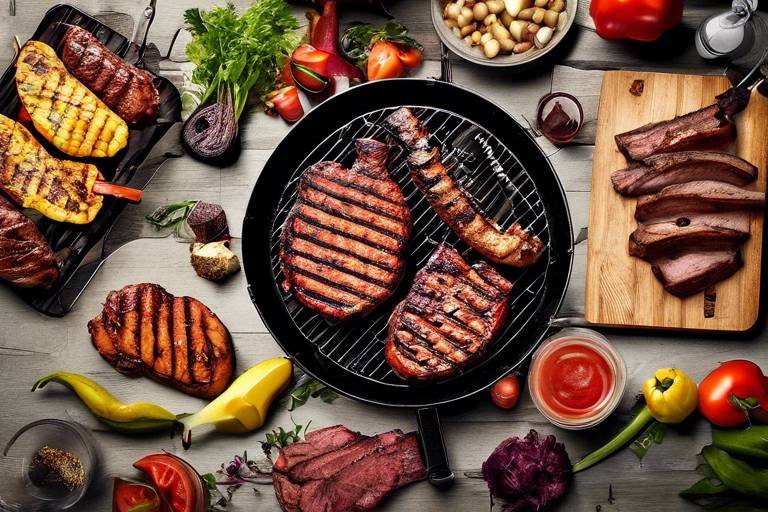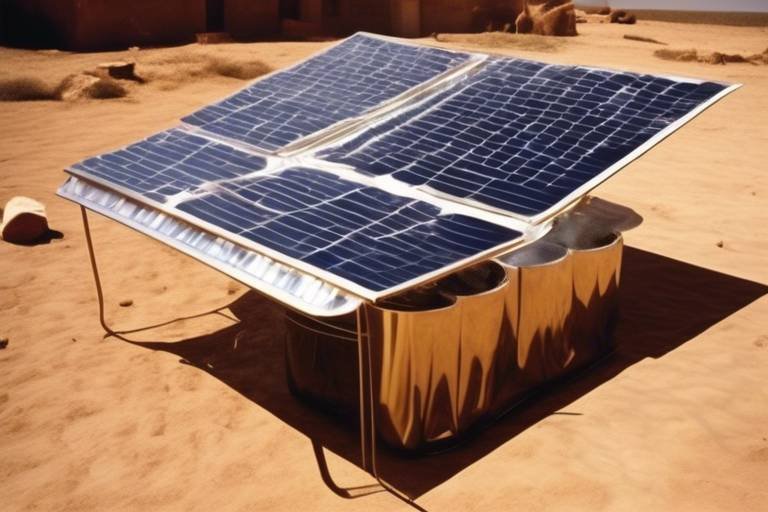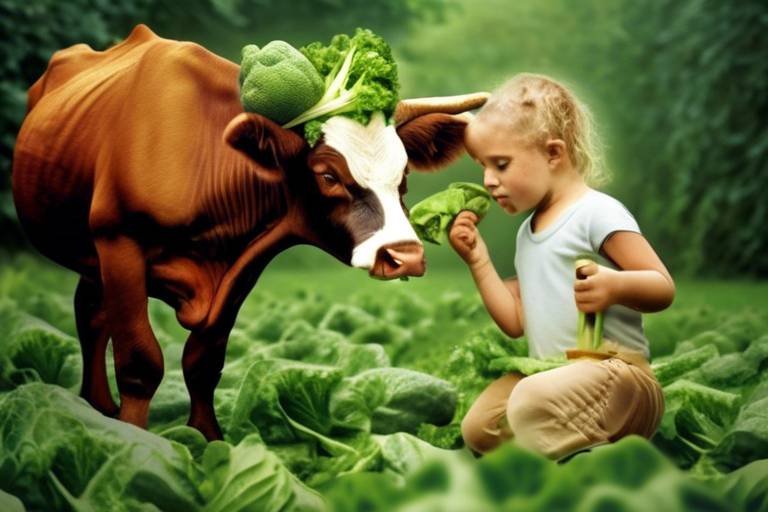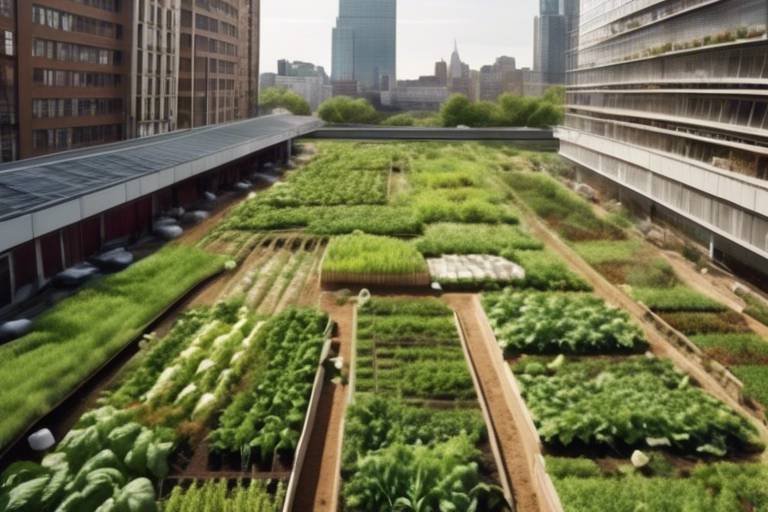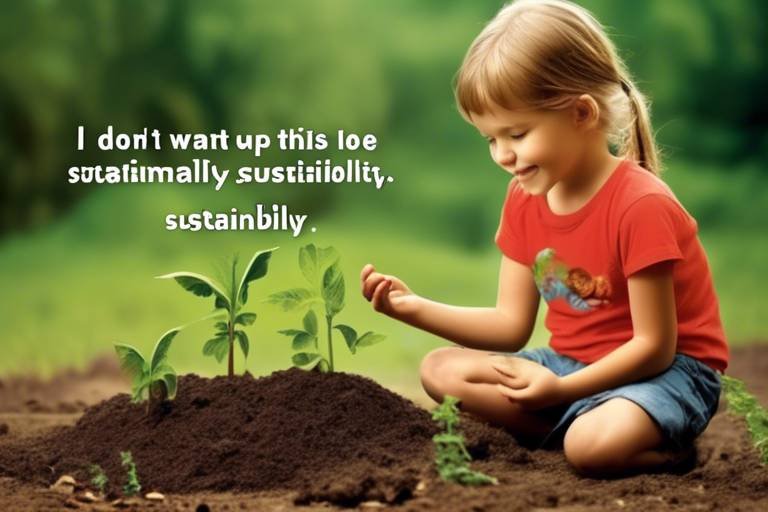How to Make Your BBQ More Sustainable
Have you ever thought about how your BBQ could be a little kinder to our planet? It’s not just about grilling up some delicious burgers and hot dogs; it’s also about making choices that leave a positive impact on the environment. Sustainability in BBQ doesn’t mean you have to sacrifice flavor or fun; in fact, it can enhance your experience! Imagine savoring that smoky flavor while knowing that your grilling habits are contributing to a healthier planet. In this article, we’ll explore various strategies to enhance the sustainability of your barbecue experience, from selecting eco-friendly materials to minimizing waste and making conscious food choices.
Let’s kick things off with the tools of the trade. The equipment you choose for your BBQ can significantly reduce its environmental impact. Opting for grills made from recycled materials or those designed for energy efficiency can make a world of difference. For instance, consider investing in a solar grill or a grill that uses less fuel. Not only do these options help in conserving energy, but they also often come with innovative features that enhance your cooking experience. Imagine grilling your favorite veggies while basking in the sun, knowing you're harnessing renewable energy!
Now, let’s talk about the fuel that fires up your BBQ. The type of fuel you use can drastically affect your BBQ's carbon footprint. Traditional charcoal can release harmful emissions, but there are sustainable alternatives that can keep your grilling green. For example, consider using biomass fuels or natural gas. These options not only burn cleaner but also provide a fantastic cooking experience.
Biomass fuels, derived from organic materials, are an excellent choice for eco-conscious grillers. They produce less smoke and carbon dioxide compared to traditional charcoal. Similarly, natural gas is a cleaner burning fuel that can reduce your BBQ’s environmental impact. If you’re curious about integrating these fuels into your grilling routine, many modern grills are designed to accommodate them easily, allowing you to enjoy your BBQ guilt-free!
When comparing wood pellets to charcoal, it’s essential to consider not only the flavor but also the environmental impact. Wood pellets provide a sustainable grilling option that imparts a unique flavor to your food. They are made from compressed sawdust and are often sourced from sustainably managed forests. In contrast, traditional charcoal can lead to deforestation and habitat destruction. By choosing wood pellets, you’re not just grilling; you’re making a statement about sustainability and flavor!
Have you ever thought about cooking with the sun? Solar grills harness renewable energy and provide a unique cooking experience that is both fun and environmentally friendly. These grills use reflective surfaces to concentrate sunlight, allowing you to cook without any fuel at all. Imagine hosting a BBQ while showcasing a solar grill; it’s a conversation starter and a step towards a greener lifestyle!
Next up, let’s dive into what you’re actually cooking. Using locally sourced and seasonal produce not only supports local farmers but also reduces transportation emissions. When you choose ingredients that are in season, you’re not just getting the freshest flavors; you’re also minimizing your carbon footprint. Think about it: when you buy strawberries in winter, they’ve traveled thousands of miles. Instead, why not grill up some fresh zucchini or corn in the summer? It’s a win-win for your taste buds and the environment!
Now, let’s tackle a significant aspect of sustainability: minimizing food waste. It’s crucial for a sustainable BBQ. By planning effectively, you can serve delicious meals without the guilt of throwing away leftovers. One effective strategy is to gauge your guests' appetites accurately. You can do this by asking them in advance what they would like to eat, ensuring you prepare just the right amount. No one likes to see perfectly good food go to waste!
Serving appropriate portion sizes can significantly cut down on waste. It’s all about knowing your crowd and planning accordingly. For instance, if you’re having a gathering with friends, consider the mix of appetites and preferences. Providing a variety of options in smaller portions can encourage guests to try different dishes without overloading their plates.
Speaking of leftovers, transforming them into new dishes is a fantastic way to minimize waste. Think about how you can use leftover grilled chicken in a salad or turn extra veggies into a delicious stir-fry. The possibilities are endless! Not only does this reduce waste, but it also allows you to enjoy the flavors of your BBQ long after the party is over.
Cleaning up after a BBQ can generate waste, but it doesn't have to. By adopting sustainable clean-up practices, you can help protect the environment. Start by using biodegradable cleaning supplies. These products break down naturally and reduce chemical runoff into our waterways. Plus, they’re often just as effective as traditional cleaners!
Understanding how to dispose of BBQ waste responsibly is essential. Set up a simple waste management system at your BBQ. Have separate bins for recycling, composting, and regular trash. Not only does this make clean-up easier, but it also ensures that more of your waste is processed sustainably. By taking these small steps, you’re contributing to a healthier planet.
- What are some eco-friendly grilling options? Consider using solar grills, biomass fuels, or natural gas for a more sustainable BBQ experience.
- How can I reduce food waste at my BBQ? Plan serving sizes according to your guests' appetites and get creative with leftover recipes.
- What should I do with BBQ waste? Implement a waste management system that includes recycling, composting, and proper trash disposal.

Selecting Sustainable Grilling Equipment
When it comes to hosting the perfect BBQ, the equipment you choose plays a pivotal role in not only the quality of your food but also in minimizing your environmental impact. Opting for sustainable grilling equipment is like choosing a trusty sidekick in your culinary adventures—it enhances your experience while being kind to the planet. But what does it mean to select sustainable grilling gear? It’s all about making informed choices that prioritize eco-friendliness without sacrificing performance.
First off, consider the materials used in your grill. Stainless steel and cast iron are excellent options because they’re durable and recyclable. Unlike cheaper, plastic alternatives that might end up in landfills, these materials can withstand the test of time and nature. Plus, they often come with better heat retention properties, which means you’ll use less fuel to achieve that perfect sear on your steaks or veggies.
Another important aspect is energy efficiency. Traditional charcoal grills can produce a significant amount of emissions, but many brands now offer electric or gas grills that are designed to be more eco-friendly. For instance, propane grills emit fewer pollutants compared to charcoal, and they’re often easier to control, allowing you to grill more efficiently. Furthermore, some innovative designs even incorporate solar technology, harnessing the sun’s power to cook your food. Imagine flipping burgers while basking in the sun, knowing you’re making a positive impact!
Don’t overlook the utensils you use either! Opt for tools made from sustainable materials like bamboo or recycled metals. These not only reduce the carbon footprint associated with production but also add a unique flair to your BBQ setup. Investing in reusable plates and utensils can also significantly cut down on single-use plastics, which is a win-win for both your BBQ and the environment.
In terms of grilling accessories, consider items such as reusable grill mats or biodegradable charcoal starters. These alternatives can help you minimize waste and enhance your grilling experience. Plus, they often come in fun designs that can add a touch of personality to your outdoor gatherings.
To summarize, selecting sustainable grilling equipment is about making conscious choices that reflect your values. By investing in durable materials, energy-efficient designs, and eco-friendly accessories, you can create a BBQ experience that’s not just delicious but also sustainable. It’s like planting a seed for future generations—one that grows into a greener, healthier planet.
- What materials should I look for in sustainable grilling equipment? Look for durable materials like stainless steel and cast iron, which are both recyclable and long-lasting.
- Are propane grills better for the environment than charcoal grills? Yes, propane grills generally produce fewer emissions compared to traditional charcoal grills, making them a cleaner option.
- How can I reduce waste while grilling? Use reusable plates and utensils, and consider investing in biodegradable or compostable grilling accessories.

Eco-Friendly Charcoal and Fuel Options
When it comes to grilling, the fuel you choose plays a pivotal role in determining the environmental impact of your BBQ. Traditional charcoal, while popular, often contributes to significant carbon emissions and deforestation. However, there are eco-friendly charcoal alternatives and fuel options that can help you grill sustainably without compromising on flavor or experience. Let's dive into some of these greener choices that can elevate your BBQ game while being kind to our planet.
One of the most notable alternatives to traditional charcoal is biomass fuels. These fuels are made from organic materials, such as agricultural waste, wood chips, and even sawdust. By using biomass, you’re not only reducing waste but also utilizing materials that would otherwise contribute to landfill overflow. Moreover, biomass burns cleaner than traditional charcoal, producing less smoke and fewer harmful emissions. This means you can enjoy your grilled delicacies while knowing you’re making a positive impact on the environment.
Another fantastic option is natural gas. Many modern grills come equipped to use natural gas, which burns much cleaner than charcoal. The convenience of natural gas is also a big plus; you can fire up your grill with just a flick of a switch, allowing for a seamless cooking experience. If you’re considering this option, it’s worth checking if your local utility offers incentives for switching to natural gas, as it can often be a more economical choice in the long run.
When we talk about sustainable grilling, wood pellets deserve a spotlight. These little nuggets of compressed sawdust not only provide a unique flavor profile but also present a more sustainable option compared to traditional charcoal. Wood pellets produce less ash and smoke, making clean-up easier and more environmentally friendly. Plus, they come in various flavors, allowing you to customize your grilling experience. Imagine the smoky taste of hickory or the sweet notes of applewood enhancing your grilled meats and veggies!
However, it’s essential to consider the sustainability of the wood source. Always opt for pellets that are certified by the Forest Stewardship Council (FSC) or similar organizations to ensure that the wood is sourced responsibly. The impact of your grilling extends beyond just the cooking process; it’s about making informed choices from start to finish.
If you’re looking for an innovative and truly sustainable option, solar grilling technology is an exciting avenue to explore. Solar grills use the sun’s energy to cook food, eliminating the need for any fuel source that emits carbon. These grills are not only eco-friendly but also provide a unique cooking experience. Imagine grilling your burgers and veggies while soaking up the sun on a warm day—the experience is as delightful as the food itself!
Getting started with solar grilling is easier than you might think. There are various models available on the market, ranging from simple solar ovens to more advanced solar grills. They are perfect for outdoor gatherings, camping trips, or even just a sunny afternoon in your backyard. Plus, using solar energy means you’re harnessing a renewable resource, making it a win-win for your BBQ and the environment.
In summary, choosing eco-friendly charcoal and fuel options can significantly reduce your BBQ's carbon footprint. By opting for biomass fuels, natural gas, wood pellets, or even solar grilling, you can enjoy delicious meals while being a responsible steward of the environment. Remember, every small change contributes to a larger impact, and your BBQ can be both fun and sustainable!

Biomass and Natural Gas
When it comes to making your BBQ more sustainable, biomass fuels and natural gas stand out as two of the cleanest alternatives to traditional charcoal. But what exactly are these fuels, and why should you consider them for your next grilling adventure? Let's dive in!
Biomass fuels are derived from organic materials, such as wood chips, agricultural residues, or even dedicated energy crops. They are renewable because they can be replenished over time. When you use biomass, you’re not just grilling; you’re participating in a cycle that promotes sustainability and reduces reliance on fossil fuels. Imagine cooking your favorite ribs while knowing that the energy source is sourced responsibly from nature!
Natural gas, on the other hand, is a cleaner-burning fossil fuel compared to coal or oil. When you fire up a natural gas grill, you’re emitting significantly fewer greenhouse gases. It’s like having a BBQ that’s not just tasty, but also kind to the planet. Plus, natural gas grills heat up quickly and allow for precise temperature control, giving you that perfect sear on your steaks without the environmental guilt.
So, how do you integrate these options into your grilling routine? Here are some points to consider:
- Availability: Check if your local suppliers offer biomass fuels or natural gas options. Many regions have started promoting these sustainable fuels, so you might find them more accessible than you think.
- Grill Compatibility: Ensure that your grill is compatible with the fuel you choose. Some grills are designed specifically for natural gas, while others can be adapted for biomass use.
- Flavor Profile: Biomass, especially wood pellets, can impart unique flavors to your food. Experiment with different types of biomass to find the one that enhances your BBQ experience.
In summary, switching to biomass and natural gas not only helps reduce your BBQ’s carbon footprint but also enhances your overall grilling experience. So, why not give them a try? You’ll be surprised at how much you can enjoy your BBQ while being more eco-friendly!

Wood Pellets vs. Charcoal
When it comes to grilling, the choice between wood pellets and traditional charcoal can feel like a battle of titans. Both options have their loyal fans, but understanding the differences can help you make a more sustainable decision. First off, let’s talk about environmental impact. Wood pellets are made from compressed sawdust, which means they utilize waste from lumber production. This not only reduces waste but also offers a renewable energy source that’s generally considered more eco-friendly than charcoal, which is often derived from trees that are cut down specifically for fuel.
In terms of flavor, wood pellets can give your food a distinct, smoky taste that varies depending on the type of wood used. Whether you're grilling with hickory, mesquite, or applewood, each type adds its unique flavor profile. Charcoal, on the other hand, tends to impart a more uniform taste, which can be great for traditionalists but might lack the complexity that wood pellets offer. Imagine grilling a steak with the rich, sweet flavor of applewood; it’s an experience that can elevate your BBQ to a whole new level.
Now, let’s consider burn time and temperature control. Wood pellets burn more consistently and can be easier to manage, especially with pellet grills that allow you to set a specific temperature. Charcoal can be a bit trickier, requiring skill to maintain the right heat. If you’ve ever battled with a charcoal grill, you know how frustrating it can be to keep those coals glowing just right. With wood pellets, you can sit back and focus on the fun part—grilling!
However, there are some downsides to consider. While wood pellets can be more efficient, they typically require specialized equipment, which can be an investment. Charcoal grills, on the other hand, are widely available and can be more affordable for those just starting out. If you’re on a budget or just dipping your toes into the grilling world, a traditional charcoal grill might be the way to go.
To help you visualize the differences, here’s a quick comparison table:
| Feature | Wood Pellets | Charcoal |
|---|---|---|
| Environmental Impact | More eco-friendly, made from waste | Can contribute to deforestation |
| Flavor | Varies by wood type, adds complexity | Uniform smoky flavor |
| Temperature Control | Easy, consistent | Requires skill to maintain |
| Cost | Higher initial investment | Generally more affordable |
Ultimately, the choice between wood pellets and charcoal boils down to personal preference and what you value most in your grilling experience. If you’re passionate about sustainability and flavor, wood pellets might be your best bet. However, if you enjoy the traditional grilling method and want to keep things simple, charcoal could still hold a special place in your heart. Either way, both options can lead to deliciously grilled meals that can be enjoyed with family and friends!

Solar Grilling Technology
Imagine harnessing the power of the sun to cook your food—sounds like something out of a sci-fi movie, right? But with , this dream is now a delicious reality! Solar grills use the sun's rays to generate heat, allowing you to grill, bake, and even roast without the need for traditional fuels. It’s like turning your backyard into a mini-solar power plant, and what’s cooler than that?
These innovative grills come in various designs, ranging from simple solar cookers made of reflective materials to more sophisticated models that incorporate parabolic mirrors. The basic principle is straightforward: sunlight is concentrated onto a cooking surface, generating heat that cooks your food. The beauty of solar grilling is that it’s not just eco-friendly; it’s also incredibly efficient. On a sunny day, you can achieve cooking temperatures comparable to traditional grills, making it a viable option for your next barbecue.
One of the most exciting aspects of solar grilling is its sustainability. By using renewable energy, you significantly reduce your carbon footprint. There’s no smoke, no charcoal, and no propane tanks to worry about. Plus, solar grills are often portable, making them perfect for camping trips or picnics in the park. Just set it up, let it soak in the sunlight, and you’re on your way to a guilt-free grilling experience!
However, it’s essential to consider a few factors when diving into solar grilling. Weather conditions play a significant role; you’ll need a sunny day to achieve optimal cooking results. Additionally, solar grills typically require a bit more time to cook food compared to traditional methods. But think of it this way: it’s an excellent excuse to slow down, enjoy the outdoors, and have a leisurely meal with friends and family. After all, isn’t that what barbecuing is all about?
To help you get started, here are some tips for using solar grills effectively:
- Choose the Right Time: Aim to grill during peak sunlight hours for the best results.
- Use Lighter Foods: Foods like vegetables and fish cook faster than denser meats, making them ideal for solar grilling.
- Preheat the Grill: Just like a traditional grill, giving your solar grill time to heat up will yield better cooking results.
In summary, solar grilling technology is an exciting and sustainable way to enjoy your BBQ. By embracing this innovative method, you’re not just cooking food; you’re also making a statement about your commitment to the environment. So, why not give it a try at your next gathering? You might just find that cooking with the sun is a game-changer!

Choosing Local and Seasonal Ingredients
When it comes to making your BBQ more sustainable, one of the most impactful choices you can make is to choose local and seasonal ingredients. Imagine biting into a juicy tomato that was picked just hours ago from a nearby farm, bursting with flavor and nutrients. Not only does this choice support local farmers, but it also significantly reduces the carbon footprint associated with transporting food over long distances. By selecting ingredients that are in season, you’re not only enhancing the taste of your dishes but also aligning your BBQ with nature's rhythms.
Seasonal produce is typically fresher and more flavorful, making it a win-win for both your taste buds and the environment. For instance, summer brings a bounty of vibrant vegetables like zucchini, bell peppers, and corn, perfect for grilling. Similarly, fall offers delicious root vegetables and squashes that can be roasted to perfection. By planning your BBQ menu around what’s available locally and in season, you’ll not only enjoy tastier food but also contribute to a more sustainable food system.
Furthermore, shopping at local farmers' markets can be a delightful experience. It allows you to interact directly with the growers, gaining insight into their farming practices and the story behind your food. You might even discover unique varieties of vegetables and herbs that you wouldn’t find in a typical grocery store. This connection to the source of your ingredients can deepen your appreciation for the meal you’re preparing.
Here are a few additional reasons why choosing local and seasonal ingredients is a smart move for your BBQ:
- Supports the local economy: Your purchases help sustain local farmers and businesses, keeping your community vibrant.
- Reduces environmental impact: Less transportation means lower greenhouse gas emissions, making your BBQ more eco-friendly.
- Enhances flavor: Fresher ingredients mean better taste, elevating your BBQ experience.
In conclusion, the next time you fire up the grill, take a moment to consider the origins of your ingredients. Making a conscious effort to choose local and seasonal options not only benefits your palate but also plays a crucial role in promoting sustainability. So, why not support your local farmers and treat your guests to a BBQ that’s bursting with flavor and good for the planet?
Q: What are the benefits of using local ingredients for my BBQ?
A: Local ingredients are fresher, more flavorful, and support your local economy while reducing transportation emissions.
Q: How can I find out what’s in season?
A: You can check local farmers' markets, agricultural extension offices, or websites dedicated to seasonal produce in your area.
Q: Are there specific seasonal ingredients I should focus on for summer BBQs?
A: Yes! Look for summer vegetables like corn, zucchini, tomatoes, and peppers, as well as fruits like peaches and berries for desserts.

Reducing Food Waste at Your BBQ
When it comes to hosting a barbecue, we often get caught up in the excitement of grilling and gathering with friends. However, one aspect that tends to slip our minds is the **impact of food waste** on our environment. Did you know that nearly one-third of all food produced globally goes to waste? This staggering statistic serves as a wake-up call for all of us to take action, especially during our BBQs. By implementing a few thoughtful strategies, we can significantly reduce food waste and make our gatherings more sustainable.
One of the simplest yet most effective ways to minimize waste is through careful planning. Before you start shopping for ingredients, take a moment to consider how many guests you’ll be hosting and what their appetites might be like. It’s all about striking a balance between providing enough food and avoiding over-preparation. You might think, “But what if my friends are really hungry?” Well, it’s better to have a little extra than to end up with mountains of leftovers that eventually go uneaten. A good rule of thumb is to serve about 1/2 pound of meat per guest and to complement it with plenty of sides, which can be made from seasonal ingredients that are often more affordable and fresher.
Another effective strategy is to serve appropriate portion sizes. Instead of piling food onto plates, consider offering smaller servings that guests can come back for if they’re still hungry. This not only reduces waste but also encourages people to savor their food. Think about it: how often do we take more than we can eat simply because it’s there? By serving smaller portions, we can create a more mindful eating experience. You might even want to provide a variety of dishes in smaller bowls, allowing everyone to sample different flavors without overindulging.
Now, let’s talk about leftovers. Instead of tossing out uneaten food, why not get creative? Transforming leftovers into new dishes is a fantastic way to minimize waste and impress your guests with your culinary skills. For instance, leftover grilled vegetables can be tossed into a salad or blended into a delicious soup. Similarly, any remaining meat can be shredded and used in tacos or sandwiches. The possibilities are endless! Here are a few ideas to inspire you:
- Grilled Veggie Frittata: Whisk eggs and add chopped leftover veggies for a quick breakfast or brunch.
- BBQ Chicken Pizza: Use leftover grilled chicken and barbecue sauce as toppings on a pizza.
- Meat and Veggie Stir-Fry: Combine leftover proteins and veggies in a stir-fry for a quick dinner.
Lastly, don’t forget about the importance of proper food storage. After your BBQ, store any leftovers in airtight containers to keep them fresh for longer. Label them with the date they were made, so you can keep track of what needs to be eaten first. This not only helps in reducing waste but also makes meal prep easier throughout the week. Remember, a little planning goes a long way!
In conclusion, reducing food waste at your BBQ is not just about being environmentally conscious; it’s about being resourceful and creative. By planning ahead, serving sensible portions, getting inventive with leftovers, and practicing proper storage techniques, you can enjoy your barbecue without the guilt of waste. So, the next time you fire up the grill, think of the planet and let’s make our BBQs not just tasty, but also sustainable!
1. What are some easy ways to reduce food waste at home?
Start by planning your meals, making shopping lists, and storing food properly. You can also get creative with leftover ingredients to create new meals!
2. How can I encourage my guests to take smaller portions?
Consider serving food in smaller bowls and plates, and let guests know they can come back for seconds if they’re still hungry.
3. What should I do with leftovers after my BBQ?
Transform them into new dishes, like salads, sandwiches, or soups. Proper storage in airtight containers will keep them fresh for later use.

Smart Serving Sizes
When it comes to hosting a BBQ, one of the biggest challenges is ensuring that everyone has enough to eat without creating mountains of leftovers that end up in the trash. The key to achieving this balance lies in . Think of it like a well-choreographed dance: each guest has their role, and when everyone is in sync, the experience is delightful without the unnecessary waste. So how do you gauge appetites and plan accordingly? Let’s dive into some practical strategies!
First off, it’s essential to consider the type of gathering you’re hosting. Is it a casual get-together or a more formal affair? The atmosphere can greatly influence how much people eat. For instance, at a laid-back BBQ, guests may be more inclined to sample a variety of dishes, whereas at a formal gathering, they might stick to a main course. A good rule of thumb is to offer a variety of options without overwhelming your guests. This way, they can choose what they love without feeling pressured to take too much.
Next, think about the appetite of your guests. Are they kids, adults, or a mix? Children typically eat smaller portions than adults, so it’s wise to adjust accordingly. Here’s a simple breakdown to consider:
| Guest Type | Suggested Serving Size |
|---|---|
| Children (Ages 4-10) | 1/2 to 1 serving of main dish |
| Teens (Ages 11-17) | 1 to 1.5 servings of main dish |
| Adults | 1.5 to 2 servings of main dish |
Also, consider incorporating a buffet-style serving where guests can help themselves. This not only allows them to take what they want but also encourages them to return for seconds if they’re still hungry. Just make sure to have enough variety so that everyone can find something they enjoy. You might be surprised at how much this approach reduces waste!
Another effective strategy is to pre-portion some items. For example, if you’re serving burgers, consider pre-assembling a few with toppings, while leaving the rest of the fixings out for guests to customize their own. This not only makes it easier for guests to grab their food but also helps you control the amount of food served, reducing the chances of overestimating how much to prepare.
Lastly, don’t forget about leftovers! If you find that you still have food left over, think about how you can creatively use it. For example, leftover grilled vegetables can be tossed into a salad or used in a stir-fry the next day. Being mindful of how much food you serve and having a plan for any leftovers can significantly cut down on waste, making your BBQ not just enjoyable but also more sustainable.
- How can I estimate how much food to prepare for my BBQ?
A good rule of thumb is to plan for about 1/2 pound of meat per adult and 1/4 pound per child, plus sides and desserts. Adjust based on your guests' preferences. - What are some ways to repurpose BBQ leftovers?
Leftover meats can be used in sandwiches, salads, or tacos, while vegetables can be added to soups or stir-fries. - How can I ensure my guests are satisfied without wasting food?
Offer a variety of serving sizes and let guests serve themselves to help them gauge their appetite better.

Creative Leftover Recipes
After a fantastic BBQ, you might find yourself staring at a mountain of leftover food, wondering what to do with it. Instead of letting those delicious morsels go to waste, why not transform them into something new and exciting? Leftovers can be a treasure trove of culinary possibilities, allowing you to whip up quick meals that are just as delightful as the original feast. Here are some creative ideas to breathe new life into your BBQ remnants!
First up, let’s talk about BBQ Pulled Pork Tacos. If you have leftover pulled pork, simply shred it, warm it up, and serve it in soft tortillas. Add some fresh toppings like diced onions, cilantro, and a squeeze of lime for a refreshing twist. It’s like a fiesta in your mouth, and you’ll be amazed at how quickly these tacos disappear!
Next, consider making a BBQ Veggie Stir-Fry. If you grilled a variety of vegetables, chop them up and toss them into a hot skillet with some olive oil and your favorite sauce. This method not only revives those veggies but also creates a colorful and nutritious dish. You can even serve it over rice or quinoa for a complete meal. Think of it as a way to give your grilled veggies a second chance to shine!
If you have leftover grilled chicken, why not whip up a BBQ Chicken Salad? Just chop the chicken into bite-sized pieces and mix it with greens, cherry tomatoes, corn, and a tangy BBQ dressing. This salad is not only refreshing but also a fantastic way to incorporate protein into your meal without much effort. Plus, it’s perfect for a light lunch or dinner!
For those with leftover ribs, try making a BBQ Ribs Pizza. Simply shred the meat off the bone and spread it over a pizza base with your choice of sauce and toppings. Bake it until the cheese is bubbly and golden. This is a fun, family-friendly way to enjoy those ribs all over again, and who doesn’t love pizza?
Lastly, don’t forget about the sides! Leftover corn on the cob can be transformed into Corn Fritters. Just cut the kernels off the cob, mix them with flour, eggs, and spices, and pan-fry until golden brown. These little bites are crispy on the outside and tender on the inside, making them a perfect snack or appetizer.
By getting creative with your leftovers, you not only reduce waste but also discover new flavors and dishes that can become family favorites. So, the next time you have a BBQ, remember that the fun doesn’t have to end when the grill is turned off. Embrace those leftovers and let your culinary imagination run wild!
Q: How long can I keep my BBQ leftovers?
A: Generally, BBQ leftovers can be safely stored in the refrigerator for 3 to 4 days. Make sure to keep them in airtight containers to maintain freshness.
Q: Can I freeze BBQ leftovers?
A: Absolutely! Most BBQ leftovers freeze well. Just ensure they are cooled down before placing them in freezer-safe containers or bags. They can last up to 3 months in the freezer.
Q: What are some other creative ways to use BBQ leftovers?
A: You can make BBQ sandwiches, quesadillas, or even breakfast hash with your leftovers. The key is to think outside the box and get creative!
Q: Are there any safety tips for reheating BBQ leftovers?
A: Yes! Always reheat leftovers to an internal temperature of 165°F (74°C) to ensure they are safe to eat. Use a food thermometer for accuracy.

Eco-Conscious BBQ Clean-Up
Cleaning up after a barbecue can often feel like a daunting task, especially when you're trying to be environmentally conscious. But fear not! With a few simple strategies, you can turn your clean-up into an eco-friendly affair. Just think of it as the final touch to your sustainable BBQ masterpiece. After all, what’s the point of enjoying delicious grilled food if you’re leaving a trail of waste behind? Let's explore some effective ways to ensure your BBQ clean-up is as green as your grilling.
First and foremost, choosing biodegradable cleaning supplies can make a significant difference. Traditional cleaning products often contain harsh chemicals that not only harm the environment but can also be detrimental to your health. By opting for biodegradable alternatives, you’re not only reducing chemical runoff but also supporting brands that prioritize sustainability. Imagine cleaning your grill with a product that breaks down naturally, leaving no harmful residue behind. It's a win-win!
Now, let’s talk about waste disposal. Understanding how to properly dispose of BBQ waste is crucial for maintaining an eco-conscious mindset. You might be surprised to learn that a large portion of BBQ waste can be recycled or composted. For example, food scraps can be composted, while aluminum cans and glass bottles can be recycled. Here’s a quick breakdown:
| Type of Waste | Disposal Method |
|---|---|
| Food Scraps | Compost |
| Plastics | Recycle |
| Glass Bottles | Recycle |
| Paper Products | Compost or Recycle |
| Charcoal Ash | Dispose in the trash or use in compost (if cooled) |
By categorizing your waste, you can ensure that you’re disposing of everything correctly. It’s like a game of sorting, but with a purpose! And let's not forget about the importance of using reusable items during your BBQ. Instead of relying on disposable plates, cups, and utensils, consider investing in some durable, reusable options. Not only will this reduce waste, but it will also save you money in the long run. Plus, there’s something undeniably classy about serving your guests on real dishes!
Finally, after the grill is cooled down and the food is gone, take a few minutes to give your grill a good scrub. Regular maintenance will prolong the life of your grilling equipment and keep it performing at its best. A clean grill not only cooks better but also helps to avoid the need for harsh cleaning chemicals. Think of it as giving your grill a little TLC, and it’ll reward you with delicious meals for many BBQs to come!
Q: What are some eco-friendly cleaning supplies I can use?
A: Look for biodegradable dish soaps, vinegar, and baking soda. These natural alternatives are effective and gentle on the environment.
Q: Can I compost meat scraps?
A: While it’s generally not recommended to compost meat scraps due to attracting pests, you can check local composting guidelines as some facilities have special processes for handling them.
Q: How can I reduce waste at my BBQ?
A: Plan your menu carefully to avoid over-preparing food, use reusable utensils and dishes, and encourage guests to bring their own containers for leftovers.

Biodegradable Cleaning Supplies
When it comes to cleaning up after a fun-filled BBQ, the last thing you want is to contribute to environmental harm. That's where come into play! These eco-friendly products are designed to break down naturally, minimizing their impact on the planet. Imagine using a dish soap that, instead of lingering in a landfill for years, decomposes into harmless substances. It’s like treating Mother Earth to a gentle hug after your grilling festivities!
Biodegradable cleaning supplies are not only better for the environment, but they also often contain natural ingredients that are safer for you and your loved ones. Many conventional cleaning products are loaded with harsh chemicals that can irritate the skin or cause respiratory issues. By opting for biodegradable alternatives, you’re making a conscious choice to protect your health and the health of those around you.
Here are some types of biodegradable cleaning supplies you might consider for your BBQ clean-up:
- Dish soap: Look for brands that advertise their eco-friendliness and contain plant-based ingredients.
- All-purpose cleaners: These can tackle everything from greasy grill grates to sticky tables without leaving harmful residues.
- Sponges and cloths: Choose natural fiber options that can decompose after use, unlike synthetic sponges that can take hundreds of years to break down.
One of the coolest things about using biodegradable cleaning supplies is that they often come in recyclable packaging. This means that not only are you cleaning your space sustainably, but you're also ensuring that the packaging doesn’t end up in a landfill. It’s a win-win situation! Plus, many brands are now focusing on minimalist packaging, which reduces waste even further.
So, how do you choose the right biodegradable cleaning supplies? Start by reading labels and looking for certifications that indicate the product is truly eco-friendly. Check for terms like "plant-based," "non-toxic," and "biodegradable" to ensure you’re making a responsible choice. Remember, just because a product is marketed as 'green' doesn’t always mean it is, so do your homework!
In conclusion, switching to biodegradable cleaning supplies for your BBQ clean-up is a simple yet impactful way to show your commitment to sustainability. Not only do these products help preserve the environment, but they also promote a healthier atmosphere for you and your guests. So, next time you fire up the grill, remember to stock up on these eco-friendly cleaning essentials!
Q: Are biodegradable cleaning supplies as effective as traditional cleaners?
A: Yes! Many biodegradable cleaning products are formulated to be just as effective as their conventional counterparts, often using natural ingredients that break down dirt and grease effectively.
Q: How can I ensure that a product is truly biodegradable?
A: Look for certifications on the packaging, such as those from recognized environmental organizations, and check for ingredient lists that prioritize plant-based components.
Q: Can I make my own biodegradable cleaning supplies?
A: Absolutely! Many DIY recipes use simple ingredients like vinegar, baking soda, and lemon juice, which are both effective and environmentally friendly.

Proper Disposal of Waste
When it comes to hosting a BBQ, the fun and flavor can sometimes overshadow the importance of how we handle waste afterwards. However, being mindful of waste disposal is crucial for ensuring that our outdoor gatherings don't leave a negative impact on the environment. Proper disposal of waste not only helps keep our surroundings clean but also contributes to a more sustainable future. So, what can you do to ensure your BBQ clean-up is eco-friendly?
First and foremost, it's essential to understand the types of waste generated during a BBQ. Typically, you’ll encounter food scraps, packaging materials, and disposable utensils. Each of these has a different disposal method that can either benefit the environment or contribute to landfill overflow. For example, food scraps can often be composted, while plastic utensils may not be recyclable and should be disposed of properly.
One effective strategy is to set up designated waste stations at your BBQ. This means having separate bins for recycling, compost, and trash. By clearly labeling each bin, you can encourage your guests to dispose of their waste correctly. Consider the following:
- Recycling Bin: This should be for items like glass bottles, aluminum cans, and certain types of plastics. Make sure to check local recycling guidelines, as not all plastics are recyclable.
- Compost Bin: Food scraps, napkins, and biodegradable plates can go here. Composting not only reduces waste but also creates nutrient-rich soil for gardens.
- Trash Bin: This bin should be reserved for non-recyclable and non-compostable materials. Try to keep this bin as empty as possible by being mindful of what you bring to the BBQ.
Additionally, educating your guests on the importance of waste disposal can make a significant difference. A simple announcement at the beginning of the BBQ can remind everyone to think about where their waste goes. You might even consider providing reusable plates and utensils to minimize the amount of disposable waste generated. This small change can have a big impact!
After the BBQ, take a moment to sort through the waste collected. This not only helps you ensure everything is disposed of properly but also gives you a chance to reflect on how much waste was generated. You might be surprised by how much can be composted or recycled, and this awareness can help you plan for your next BBQ. Remember, every small step counts when it comes to sustainability!
Lastly, if you have leftover food that is still safe to eat, consider donating it to local shelters or community organizations. Many places are eager to accept food donations, and this can help reduce food waste while supporting those in need.
In conclusion, proper disposal of waste at your BBQ is not just about cleaning up; it's about creating a culture of sustainability. By taking proactive steps to manage waste responsibly, you can enjoy your outdoor gatherings while also protecting the environment. So, the next time you fire up the grill, remember: good food and good practices go hand in hand!
Q: What can I compost from my BBQ?
A: You can compost food scraps, napkins, and any biodegradable plates or utensils. Just ensure that no non-compostable items mix in.
Q: How can I encourage my guests to recycle properly?
A: Set up clearly labeled recycling, compost, and trash bins, and make a quick announcement about proper waste disposal at the start of the BBQ.
Q: What should I do with leftover food?
A: If the food is still safe to eat, consider donating it to local shelters or sharing it with neighbors to minimize waste.
Q: Are biodegradable utensils a good option?
A: Yes! Biodegradable utensils can help reduce plastic waste, but make sure they are compostable and check local guidelines for disposal.
Frequently Asked Questions
- What are some eco-friendly grill options?
When it comes to choosing an eco-friendly grill, consider options like electric grills, which use less energy, or grills made from recycled materials. Additionally, look for grills that use natural gas or biomass fuels, as they produce fewer emissions compared to traditional charcoal grills.
- How can I make my BBQ fuel more sustainable?
To make your BBQ fuel more sustainable, opt for eco-friendly charcoal alternatives such as coconut shell charcoal or wood pellets. These options not only reduce your carbon footprint but also provide unique flavors to your food. If you're adventurous, you might even try solar grilling, which harnesses the sun's energy for cooking!
- Why should I choose local and seasonal ingredients?
Choosing local and seasonal ingredients is a win-win for both your BBQ and the environment! It supports local farmers, reduces transportation emissions, and ensures fresher, tastier food. Plus, it allows you to showcase the best flavors of your region, making your BBQ even more special.
- How can I reduce food waste at my BBQ?
Reducing food waste starts with planning! Estimate your guests' appetites and serve appropriate portion sizes. Additionally, get creative with leftovers—transform them into new dishes rather than tossing them out. This not only minimizes waste but also gives you a chance to enjoy your BBQ flavors in different ways!
- What are some sustainable clean-up practices?
For a sustainable clean-up, use biodegradable cleaning supplies that minimize chemical runoff. After the BBQ, sort your waste properly—recycle what you can and compost organic materials. This way, you protect the environment while keeping your space tidy!
- How should I dispose of BBQ waste responsibly?
To dispose of BBQ waste responsibly, start by separating recyclables from trash. Compost food scraps and biodegradable materials whenever possible. Familiarize yourself with your local waste management guidelines to ensure you're disposing of everything correctly and sustainably.

